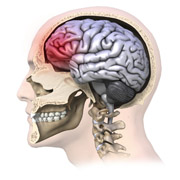Research and Innovation, UNL Office of

Center for Brain, Biology, and Behavior: Faculty Publications
Document Type
Article
Date of this Version
2022
Citation
Developmental Cognitive Neuroscience 58 (2022) 101170
doi:10.1016/j.dcn.2022.101170
Abstract
Cognitive reappraisal is a form of emotion regulation that involves reinterpreting the meaning of a stimulus, often to downregulate one’s negative affect. Reappraisal typically recruits distributed regions of prefrontal and parietal cortex to generate new appraisals and downregulate the emotional response in the amygdala. In the current study, we compared reappraisal ability in an fMRI task with affective flexibility in a sample of children and adolescents (ages 6–17, N = 76). Affective flexibility was defined as variability in valence interpretations of ambiguous (surprised) facial expressions from a second behavioral task. Results demonstrated that age and affective flexibility predicted reappraisal ability, with an interaction indicating that flexibility in children (but not adolescents) supports reappraisal success. Using a region of interest-based analysis of participants’ BOLD time courses, we also found dissociable reappraisal-related brain mechanisms that support reappraisal success and affective flexibility. Specifically, late increases in middle prefrontal cortex activity supported reappraisal success and late decreases in amygdala activity supported flexibility. Together, these results suggest that our novel measure of affective flexibility – the ability to see multiple interpretations of an ambiguous emotional cue – may represent part of the developmental building blocks of cognitive reappraisal ability.
Included in
Behavior and Behavior Mechanisms Commons, Nervous System Commons, Other Analytical, Diagnostic and Therapeutic Techniques and Equipment Commons, Other Neuroscience and Neurobiology Commons, Other Psychiatry and Psychology Commons, Rehabilitation and Therapy Commons, Sports Sciences Commons


Comments
This is an open access article under the CC BY license